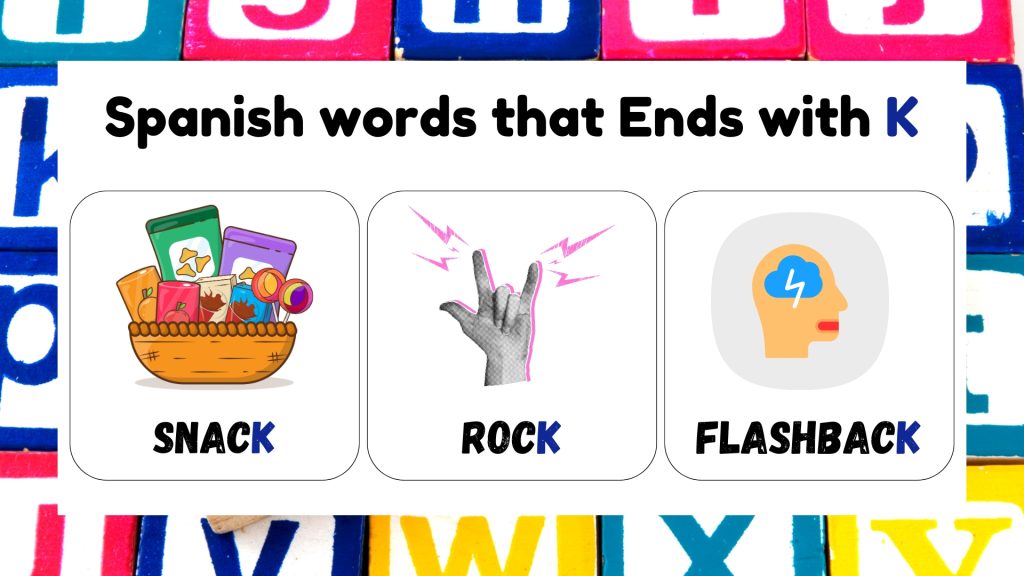The letter K in Spanish shows how the language keeps changing as it interacts with different cultures. Normally, Spanish uses the letter C or Qu for the /k/ sound. But now, we see words like ‘kilo’ or ‘kárate’ that use K, showing how Spanish borrows from other languages.
This raises interesting points about how languages evolve, mix with other cultures, and adapt over time. Looking at these ‘K’ words in Spanish helps us see the bigger picture of cultural mixing. It makes you think about what changes might come next.
History Of Letter K In Spanish Language
The letter K wasn’t always in the Spanish alphabet. It joined in 2010 because of words borrowed from other languages. Before that, Spanish used C or Q for the /k/ sound.
Adding K shows how Spanish has changed, pulling in words from around the world.
Spanish Nouns Starting With K (Sustantivos)
Looking at Spanish nouns starting with the letter K, you’ll mostly find words borrowed from other languages.

You’ll also come across words like ‘el koala’ and ‘el kilómetro’ which are from English and other languages. It’s interesting to see how these foreign words have found a home in Spanish.
| Spanish Noun | Meaning |
|---|---|
| karaoke | karaoke |
| kilogramo | kilogram |
| kiosko | kiosk |
| kayak | kayak |
| kimono | kimono |
| koala | koala |
| karate | karate |
| kiwi | kiwi (fruit) |
| ketchup | ketchup |
| karma | karma |
| kilo | kilo |
| kárateka | karate expert |
| kermés | fair, carnival |
| khat | stimulant plant |
| kundalini | spiritual energy |
| krill | small marine crustaceans |
| kárdex | filing system |
| kibutz | collective community |
| kalimba | African musical instrument |
| kayakista | kayaker |
| kinesiología | kinesiology |
| koan | Zen riddle |
| kiosquero | kiosk vendor |
| kafkiano | surreal (Kafka-like) |
| kombucha | fermented tea drink |
Spanish Verbs Starting With K (Verbos)
In Spanish, it’s rare to find verbs starting with the letter K, and those that do often come from other languages.

You don’t see these verbs used much in everyday Spanish; they usually pop up in specific areas like sports or technology.
| Spanish Verb | Meaning |
|---|---|
| katar | to bleed (archaic) |
| karatear | to practice karate |
| kermesear | to attend a fair |
| karaokeear | to sing karaoke |
| karmear | to influence spiritually |
| kayakear | to kayak |
| ketchupiar | to add ketchup |
| kimonear | to wear a kimono |
| koalear | to cling like a koala |
| kilar | to weigh in kilos |
| kakear | to mess up (slang) |
| kibernetizar | to cybernetize |
| kombuchear | to drink kombucha |
| kalimbear | to play the kalimba |
| kiosquear | to run a kiosk |
| kafkianizar | to make surreal |
| kustomizar | to customize (slang) |
| klaxonear | to honk a horn |
| kinestetizar | to sense through touch |
| kaotizar | to make chaotic |
| karmizar | to assign karma |
| katarizar | to purify through bleeding |
| kodificar | to encode |
| kayakizar | to make kayak-friendly |
| kilotear | to measure by kilos |
Learn how to use Imperative informal commands in Spanish like a native.
Spanish Adverbs Starting With K (Adverbios)
It’s pretty uncommon to find Spanish adverbs that start with the letter K.

This happens because of how the language has evolved over time. So, when you’re learning Spanish, you’ll notice that most words with a ‘K’ sound don’t actually use the letter ‘K’.
| Spanish Adverb | Meaning |
|---|---|
| kármicamente | karmically |
| kilométricamente | in a long-distance way |
| kulturalmente | culturally (variant spelling) |
| kinkymente | kinkily (slang) |
| kakofónicamente | cacophonously (phonetic twist) |
| karaokeando | while singing karaoke |
| kayakmente | in a kayak-like manner |
| kaóticamente | chaotically |
| keenmente | sharply (English influence) |
| kibernéticamente | cybernetically |
| kirchneristamente | politically like Kirchnerism |
| kómicamente | comically |
| ketoísticamente | in a keto way |
| kitadamente | removedly (from ‘quitar’) |
| kábilmente | cleverly (archaic/rare) |
| kalmadamente | calmly (spelled with K) |
| kinesiológicamente | through kinesiology |
| kinkosamente | in a kinky manner |
| kriptográficamente | cryptographically |
| kundalinicamente | through kundalini energy |
| koreográficamente | choreographically |
| konstitucionalmente | constitutionally (altered spelling) |
| kevinísticamente | like someone named Kevin (joking use) |
| kimicamente | chemically (variant spelling) |
| kafkianamente | in a Kafka-like way |
Spanish Adjectives Starting With K (Adjetivos)
In Spanish, not many words start with the letter K, but those that do often come from other languages.

It’s interesting to see how Spanish borrows from other cultures, isn’t it?
| Spanish Adjective | Meaning |
|---|---|
| kármico | related to karma |
| kilométrico | very long (distance) |
| kafkiano | surreal, absurd |
| kinky | unusual or erotic (slang) |
| kultural | cultural (alternate spelling) |
| ketchuposo | covered in ketchup (informal) |
| kimónico | kimono-related |
| kakofónico | harsh-sounding |
| kayakista | kayak-related |
| keto | ketogenic (diet-related) |
| kombuchoso | kombucha-flavored |
| kibernético | cybernetic |
| kawaii | cute (from Japanese) |
| kamikaze | reckless |
| klásico | classical (slang spelling) |
| kaleidoscópico | colorful or varied |
| karatístico | karate-style |
| kundalínico | spiritual energy-related |
| kalimbero | related to kalimba |
| koalesco | clingy or lazy (like a koala) |
| klínico | clinical (spelled with K) |
| kárstico | karstic (geological) |
| kinestésico | related to movement/touch |
| kriptoniano | like Krypton (fictional) |
| kafetero | coffee-related (alternate form) |
Learn cool Spanish words that start with X to spice up your vocabulary.
Spanish words that Ends with K
Spanish words that start with ‘K’ usually come from other languages, but finding one that ends with ‘K’ is pretty rare.

They mostly pop up in tech or science, or they’re brand names that haven’t changed to fit the usual Spanish spelling.
| Spanish Word | Meaning |
|---|---|
| crack | ace, expert |
| snack | snack |
| freak | weirdo or fan |
| rock | rock music |
| break | break (pause) |
| feedback | feedback |
| comeback | comeback |
| hack | hacker or shortcut |
| punk | punk (style/music) |
| click | click |
| pick | guitar pick |
| flashback | memory replay |
| black | black (used in branding/slang) |
| talk | chat or speech |
| link | hyperlink |
| playback | media replay |
| backpack | backpack (slang) |
| look | look/style |
| outback | remote area |
| soundtrack | film music |
| track | song or course |
| block | street block |
| check | verification |
| quick | fast (slang) |
| disk | computer disk |
Conclusion
To put it simply, adding the letter K to the Spanish alphabet has opened up the language to many new words. This shows how flexible Spanish is and its ability to adopt words from other languages, enriching its vocabulary.
It’s really about how the language grows and adapts over time.
Transform your speech style with Lingua Viva step-by-step training.
Dayron is co-owner, and the heart of Lingua Viva. He is a licensed Educator and Interpreter with 15+ years of experience, and holds a graduate degree in Foreign Language Instruction. A native Caleño who creates a comfortable environment for his students. Dayron is loved by all and inspires confidence in his students when learning and speaking Spanish. He is also an avid comedian that loves to dance salsa.











